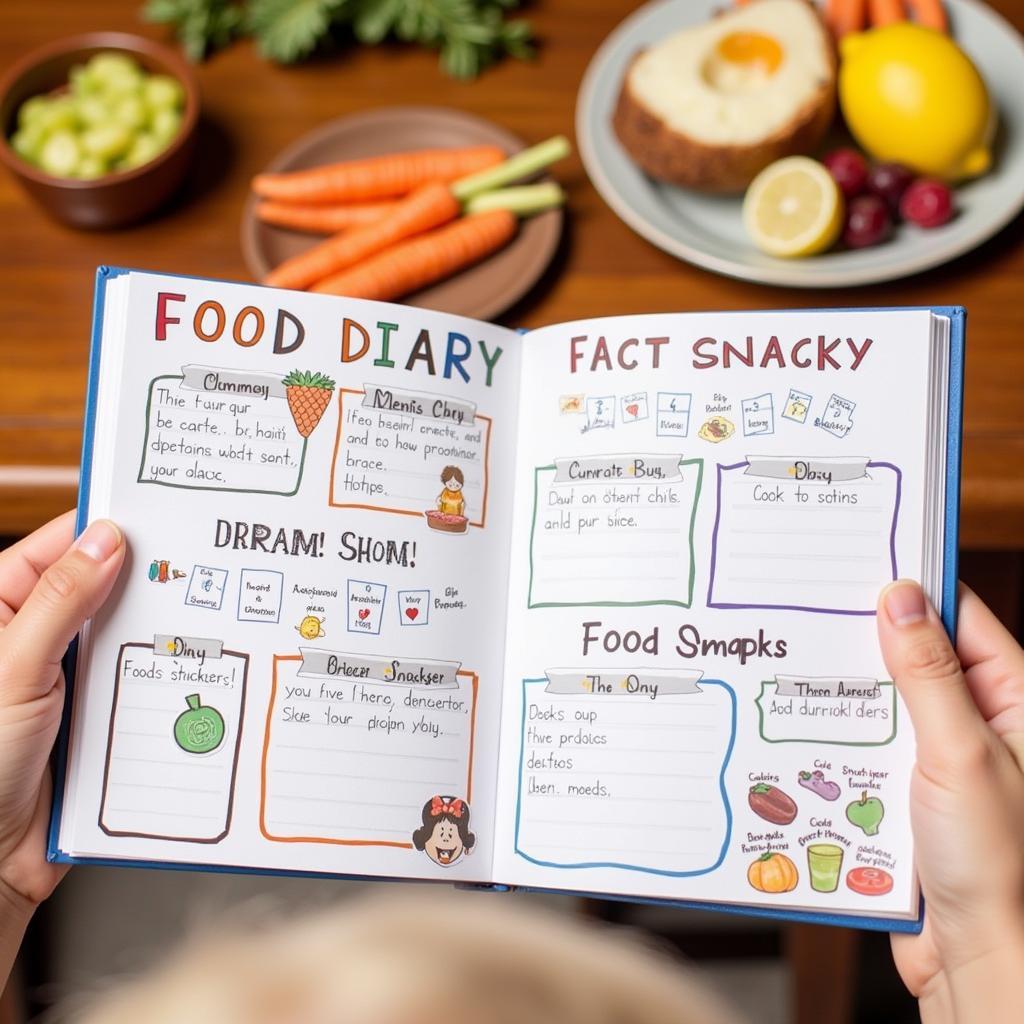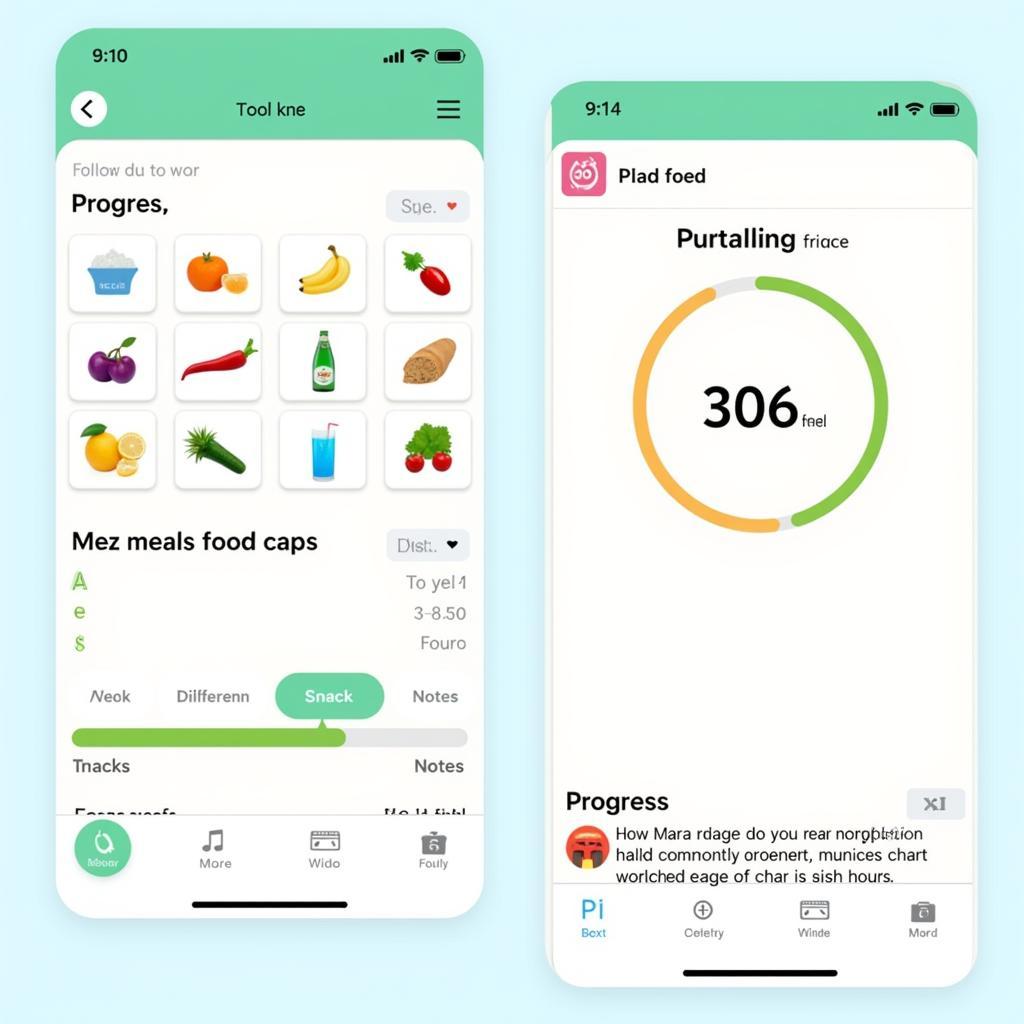A children’s food diary is a valuable tool for parents concerned about their child’s nutrition. It provides insights into eating habits, helps identify potential deficiencies, and can even be useful in managing food allergies or intolerances. Whether you’re aiming for a balanced diet, addressing picky eating, or simply wanting to understand your little one’s nutritional intake, a food diary can be a game-changer. Let’s explore the benefits and best practices of maintaining a children’s food diary.
Why is a Children’s Food Diary Important?
Maintaining a children’s food diary provides a comprehensive overview of a child’s dietary habits. This detailed record can reveal patterns you might not notice in day-to-day life. Are they getting enough fruits and vegetables? Are they consuming too many sugary drinks? A food diary can answer these questions and more, giving you a clear picture of their nutritional landscape. Furthermore, it can be an invaluable resource for healthcare professionals in diagnosing and managing dietary-related issues.
Benefits of a Food Diary for Picky Eaters
Picky eating is a common challenge for parents. A children’s food diary can be particularly helpful in understanding the nuances of a picky eater’s diet. By tracking what they eat, when they eat, and even the context surrounding mealtimes, you can begin to identify triggers for picky eating behaviors. This information empowers you to develop strategies for encouraging healthier choices and expanding their palate.
 Children's Food Diary for Picky Eaters
Children's Food Diary for Picky Eaters
How to Create and Maintain a Children’s Food Diary
Creating a food diary doesn’t have to be complicated. A simple notebook, a spreadsheet, or even a mobile app can do the trick. The most important thing is to be consistent. Record everything your child consumes, including meals, snacks, and drinks. Note the portion sizes and the time of day. You can also include information about where the food was consumed (home, school, restaurant) and the child’s mood or appetite.
Making it Fun and Engaging
Keeping a children’s food diary shouldn’t feel like a chore. Get your child involved! Let them help with recording entries, perhaps by drawing pictures of the food or using stickers. You can even turn it into a game by awarding points for trying new foods or reaching certain nutritional goals. This positive approach can transform the food diary from a monitoring tool into a fun and educational activity.
Analyzing Your Child’s Food Diary and Making Adjustments
Once you’ve collected data for a week or two, take some time to analyze the information. Look for patterns and potential areas for improvement. Are they getting enough protein? Are their meals balanced? Are they consuming too much sugar? Based on your findings, you can make adjustments to their diet, such as introducing new foods, modifying portion sizes, or swapping unhealthy snacks for healthier alternatives.
Consulting with a Nutritionist
If you’re unsure how to interpret the information in your child’s food diary or need personalized guidance, consider consulting with a registered dietitian or nutritionist. They can provide expert advice tailored to your child’s specific needs and help you develop a meal plan that supports their growth and development.
“A food diary provides invaluable insights into a child’s eating habits and can be instrumental in identifying and addressing nutritional deficiencies or imbalances,” says Dr. Amelia Carter, a pediatrician with over 20 years of experience. “It’s a simple yet powerful tool for promoting healthy eating habits from a young age.”
Tips for Success with a Children’s Food Diary
- Be Consistent: The key to a successful food diary is consistency. Try to record every meal and snack, even on busy days.
- Keep it Simple: Don’t overcomplicate the process. A simple notebook or app can be just as effective as a complex spreadsheet.
- Involve Your Child: Make it a fun and engaging activity by letting your child participate in the recording process.
- Be Patient: It takes time to establish new habits. Don’t get discouraged if you miss a few entries or if your child resists the idea initially.
- Seek Professional Advice: If you have concerns about your child’s nutrition, consult with a registered dietitian or nutritionist.
 Using a Mobile App for a Children's Food Diary
Using a Mobile App for a Children's Food Diary
In conclusion, a children’s food diary is a valuable tool for parents who want to gain a better understanding of their child’s nutritional intake. By tracking what their child eats, parents can identify potential problems and make adjustments to ensure a healthy and balanced diet. Starting a children’s food diary today can pave the way for a lifetime of healthy eating habits.
FAQ
- How long should I keep a food diary for my child? Initially, aim for a week or two to establish a baseline. You can then continue tracking periodically or as needed.
- What should I do if my child refuses to cooperate with the food diary? Try making it a fun activity by involving them in the recording process or using rewards. If they still resist, consider focusing on your own food intake as a role model.
- Can a food diary help with food allergies? Yes, a food diary can be helpful in identifying potential food allergies or intolerances by tracking reactions to specific foods.
- What’s the best way to record portion sizes? Use common household measurements like cups, tablespoons, or even hand sizes as a guide.
- Is it necessary to record every single bite my child takes? While it’s ideal to be as accurate as possible, it’s okay to estimate portion sizes if needed. The goal is to get a general overview of their eating habits.
- How can I analyze the information in the food diary? Look for patterns in their food choices, portion sizes, and nutritional intake. You can also use online resources or consult with a nutritionist for personalized guidance.
- What if I don’t see any improvements after starting a food diary? Be patient and continue tracking. It can take time to see changes in eating habits. Consider consulting with a nutritionist for additional support.
Looking for more information on children’s nutrition? Check out our other articles on healthy recipes, meal planning, and dealing with picky eaters.
Need help with your child’s nutrition? Contact us! Phone: 02437655121, Email: [email protected] Or visit us at: 3PGH+8R9, ĐT70A, thôn Trung, Bắc Từ Liêm, Hà Nội, Việt Nam. We have a 24/7 customer service team.